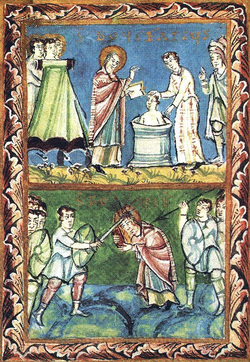
ST. BONIFACE was born at Crediton in Devonshire, England, in the year 680. Descended from a noble family, from his earliest years he showed great ability and received a religious education. His parents intended him for secular pursuits, but, inspired with higher ideals by missionary monks who visited his home, Winfrid felt himself called to a religious state. After much difficulty he obtained his father's permission and went to the monastery of Adescancastre on the site of the present city of Exeter, where, under the direction of Abbot Wolfhard, he was trained in piety and learning. His first attempt to convert the pagans in Holland having failed, he went to Rome to obtain the Pope's blessing on his mission, and returned with authority to preach to the German tribes. It was a slow and dangerous task; his own life was in constant peril, while his flock was often reduced to abject poverty by the wandering robber bands. Yet his courage never flagged.
He began with Bavaria and Thuringia, next visited Friesland, then passed on to Hesse and Saxony, everywhere destroying the idol temples and raising churches on their site. He endeavored, as far as possible, to make every object of idolatry contribute in some way to the glory of God; on one occasion, having cut down on immense oak which was consecrated to Jupiter, he used the tree in building a church, which he dedicated to the Prince of the Apostles. He was now recalled to Rome, consecrated Bishop by the Pope, and returned to extend and organize the rising German Church. With diligent care he reformed abuses among the existing clergy, and established religious houses throughout the land.
When Boniface saw that all things had been properly taken care of, he took up the work he had dreamed of in early manhood, the conversion of the Frisians. With royal consent, and with that of the pope previously given, he in 754 resigned the Archdiocese of Mainz to his disciple Lullus, whom in 752 he had consecrated bishop, again commenced a missionary tour, and laboured with success to the East of the Zuider Zee. Returning in the following year, he ordered the new converts to assemble for confirmation at Dorkum on the River Borne. The heathens fell upon them and murdered Boniface and fifty-two companions (according to some, thirty-seven). Soon afterwards, the Christians, who had scattered at the approach of the heathens, returned and found the body of the martyr and beside him the bloodstained copy of St. Ambrose on the "Advantage of Death". The body was taken to Utrecht, afterwards through the influence of Lullus removed to Mainz, and later, according to a wish expressed by the saint himself during his lifetime, to the Abbey of Fulda. Portions of his relics are at Louvain, Mechlin, Prague, Bruges, and Erfurt. A considerable portion of an arm is at Eichfeld. His grave soon became a sanctuary, to which the faithful came in crowds especially on his feast and during the Octave. England is supposed to have been the first place where his martyrdom was celebrated on a fixed day. Other countries followed. On 11 June, 1874, Pope Pius IX extended the celebration to the entire world. Brewers, tailors, and file-cutters have chosen St. Boniface as their patron, also various cities in Germany. The writings of St. Boniface which have been preserved are: "Collection of Letters"; "Poems and Riddles"; "Poenitentiale"; "Compendium of the Latin Language"; "Compendium of Latin Prosody"; "Sermons" (doubtful).
Reflection.—St. Boniface teaches us how the love of Christ changes all things. It was for Christ's sake that he toiled for souls, preferring poverty to riches, labor to rest, suffering to pleasure, death to life, that by dying he might live with Christ.




